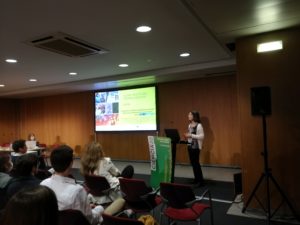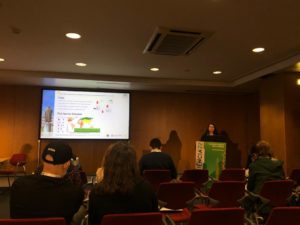On the third and final day of Encontro Ciência’22, genetics, genomics and neuroscience took centre stage in a session with the same name. GHTM researchers Sofia Seabra and Sandra Antunes were among the group of researchers whose submitted abstracts were selected for an oral presentation.
Viral genomic surveillance: phylodynamic analysis of Zika virus and proposal of a nomenclature system
Tracking viral genetic variability and its dynamics is essential for epidemiological surveillance of viral diseases. According to Sofia Seabra, “genomic surveillance has become a reference field in the post-COVID era. Reliable determination of viral genetic variants/subtypes/groups, and the identification of mutations associated with transmission and pathogenicity are essential for this surveillance and may also provide clues to potential targets for therapeutic/vaccine development”.
More than 2 billion people live in regions where the Zika virus (ZIKV) can be transmitted, and the risk of future epidemics is being seriously considered. “A classification system that reflects the true extent of ZIKV genomic variation is lacking, and in this study we aimed to characterise the genome-wide diversity and phylodynamics of ZIKV, to identify genomic footprints of differentiation patterns and to propose a dynamic classification system that reflects the degree of divergence,” said the PhD member of the TB, HIV and opportunistic diseases and pathogens – THOP GHTM research group.
This study involved the analysis of a curated dataset of publicly available viral sequences spanning the entire coding region of ZIKV across the geographic and temporal span. In addition, a combination of bioinformatics methods was applied for a comprehensive analysis of evolutionary dynamics that included recombination and phylogenetic analyses, phylogeographic reconstruction and selection detection. The researcher emphasised that “this integrated approach allowed us to explore the evolution of the virus and identify potentially relevant mutations. We identified the genetic subgroups of ZIKV and proposed a nomenclature system that avoids geographical references and is flexible to accommodate future lineages that will provide a reference for studying future outbreaks of ZIKV,” Sofia Seabra concluded.
Omics studies on Rhipicephalus bursa- Babesia ovis towards the development of tick borne diseases alternative control methods
“The (re-) emergence of tick-borne diseases (TBD) is now a recognised threat to human and animal health. Understanding the pathogen-vector paradigm remains a complicated topic, as these interactions involve a complex network of molecular interactions,” explained Sandra Antunes, PhD, Vector borne diseases and pathogens – VBD GHTM Research group. Studies focusing on these relationships could identify important molecular steps that can be targeted to reduce vector competence and control disease. “The discovery of relevant molecules at the tick-pathogen interface is essential for the development of promising alternative (to acaricides) TBD control methods, such as vaccination. The Rhipicephalus bursa – Babesia ovis model has been established and contributes to the identification of such molecules”.
Regarding the results, the researcher emphasised that “comparative analysis of the transcriptomes and proteomes of the salivary glands of R. bursa under different conditions revealed that blood feeding stimulates the production of tick molecules, which translates into increased gene expression and protein synthesis”. Furthermore, “the data revealed that the combination of feeding and infection positively affected gene expression but negatively affected translation, suggesting that B. ovis may manipulate R. bursa sialome”. “These results, in conjunction with interference RNA and reverse vaccinology, allowed us to explore the cellular machinery of the tick and identify multiple targets as potential vaccine antigens. These studies deepen our knowledge of tick-pathogen interactions and the discovery of new targets for infectious disease prevention and control,” Sandra Antunes concludes.
Learn more about these presentations in the “Theme session” botton on the Encontro Ciência’22 website.

